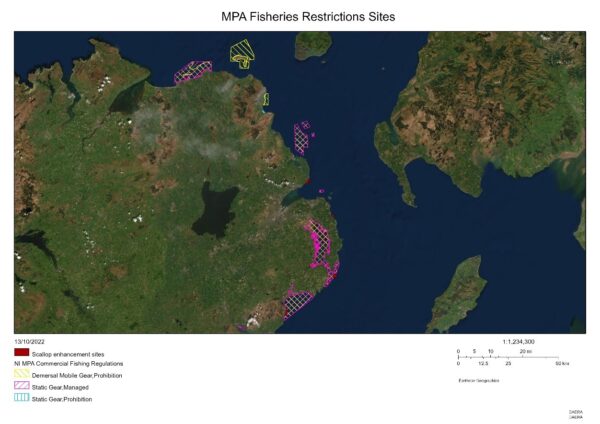The Marine Protected Areas (Prohibited Methods of Fishing) Regulations (Northern Ireland) 2022 came into operation from 1 January 2023, prohibiting demersal mobile gear (bottom-towed) in nine inshore MPAs, alongside management of pot fishing activity.
A collection of Northern Ireland organisations including DAERA, AFBI, environmental NGOs and the fishing industry have come together to discuss fishery management measures for current inshore Marine Protected Areas (MPAs) under the newly formed group, ‘Co-Fish: Fisheries & Conservation Partnership’.
The Northern Ireland inshore region provides important fishing grounds for lobsters, crabs and scallops, and the fishing industry is committed to sustainability. Co-Fish provides a forum for co-management of the MPA network to enable sustainable fishing and protection of the marine environment.
Specifically, this group was created to (1) ensure regulations are delivering benefits for the marine environment through improved efficiency of the MPA network via co-design of management and monitoring strategies, (2) coordinate knowledge sharing between government departments, industry and stakeholders, (3) ensure where possible, maintenance of the socio-economic sustainability of marine users, and (4) consider funding avenues for enhanced monitoring programmes, engagement through education, and compliance with new regulations.
In Northern Ireland, under the Marine Act (Northern Ireland) 2013, a total of 38% of the inshore region in Northern Ireland is currently covered by a MPA, surpassing the 30×30 target that was agreed in the new global biodiversity framework.
Four scallop enhancement sites were also created under the Scallop Enhancement Sites (Prohibited Methods of Fishing) Regulations (Northern Ireland) 2022, through request from the fishing industry to assist in the recovery of scallop populations in Northern Irish waters. These include sites at Whitehead, Drumfad Bay, Ballyquintin Point and Roaring Rock.
Co-Fish first met in Kilkeel in October 2022 to provide a forum for co-design and co-management, where all members could collectively agree on a monitoring strategy to assess the impact of recent fishing regulations in line with conservation objectives as well as socio-economic prosperity. Current monitoring to improve baselines is already underway including camera and dive surveys, benthic sampling, and habitat modelling. An evidence-based approach is key to ensuring these new MPA regulations deliver on boosting biodiversity to help maintain sustainable and economical fisheries in Northern Ireland and create a productive and resilient marine environment for all.
Source: DAERA and NIMTF
